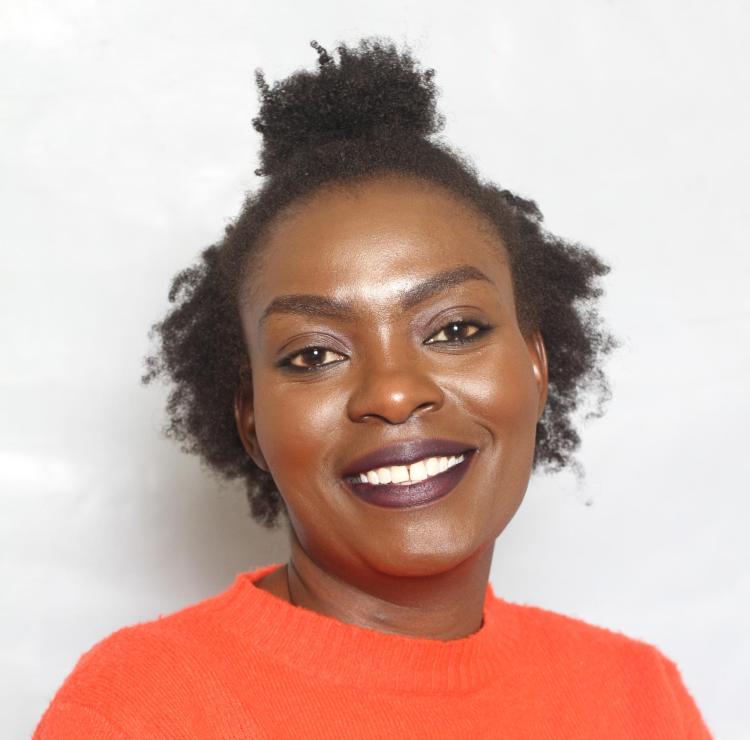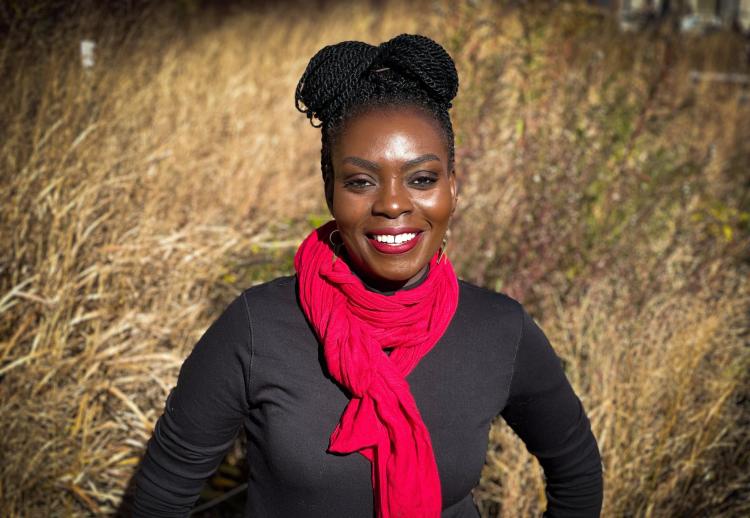Five Questions for the Fellows: Mercy Orengo
The Ted Scripps Fellowships have been bringing award-winning environmental journalists to CU Boulder for 26 years. Fellows embark on a year of courses, projects, field trips, seminars and more— taking advantage of everything university life has to offer. This series is a chance to get to know this year’s cohort of talented journalists beyond what a typical bio page will tell you.

Orengo sat down with CEJ graduate assistant Devin Farmiloe to talk about her work and experience as a fellow.
Your past work dealt a lot with climate and climate change. One of the things you have worked on recently that I am interested in is the research gaps in Africa that are hindering the continent's participation in climate solutions. Could you tell me some more about that line of inquiry?
I've done a lot of climate change stories, but in a broader perspective. After I graduated, and just as I was applying for the Scripps fellowship, I thought about climate reporting in the Global South. I started doing independent research on some of the body of work that has been done by journalists and researchers. One of the things that I found was that women are disproportionately represented in climate change conversations, especially in the Global South. That is in both journalistic work and those championing climate change issues. You don't hear a lot of women's voices. If it's a global story, you rarely see the Global South, especially Africa, being quoted independently or being quoted as progressive. Most of the time when we are writing about climate change in Africa, it's always about how Africa still lags behind. Yet Africa is rarely included in conversations about climate change.
During your time in the fellowship, you are working on ways to use new media to help promote climate stories in Kenya, and potentially Africa as a whole. How is that going?
Looking at the media in Kenya, climate change issues rarely make it to the front page. That's because our papers and newsrooms are mostly political, or they just think that climate change issues aren't as close to home as other continents. I want to approach that. I'm thinking of creating a space to highlight some of the climate change issues, and especially how climate change affects people at the grassroots level, because most of the time when climate change issues make it in the newspaper, it's always policy-based. But we rarely look at how that then affects the farmer in the village. How does this affect women? Who determines the kind of fuel we'll be using to light up the house or to cook? I want to break down climate change issues in a way that people can read and identify that this is a climate change story, and it affects someone who is beyond a policymaker.
I always find it interesting that when issues of global warming or climate change are being discussed, people don't focus so much on Africa. Yet the impact is being felt so much in Africa, but since the attention hasn't been there, the mitigation is not there. Even the most basic things haven't been embedded in the culture, because for a long time, it's been ignored. So while major stakeholders were focusing on the US and Europe, because they were the mass producers of pollutants, the effects of that were being felt in Africa and in nations of the Global South. But since the focus wasn't there, the mitigation was not put there. It means then that the impact that they're feeling doesn't even have a place where someone can say “these are some of the things that are being done to prevent that.” So we are having diseases that we didn't have in the past, we are having crises that we never had in the past, yet we do not have the mechanism to help with that, because the global attention hasn't been on us. So to me it feels like they are groping in the dark.
What have you enjoyed most about the fellowship program so far?
I look at it three ways. The first is the social part of just meeting people who are coming from different backgrounds. I'm meeting people who have done very remarkable things in their own fields. The fellows here, we aren't just having conversations on a professional level, but personal level as well. For me it's just knowing that if I ever get stuck, whether I'm doing this fellowship, or after I've finished the fellowship, I'll always have these people who I can reach out to and be like, “Hey, I'm stuck here.” It's so beautiful, forming friendships with people who I didn't know before, and organizing for these trips, and hugging these people. You know, if I was having some personal stuff, just knowing that I can call these people and they would show up. I think that's something that we rarely get an opportunity to talk about. Just knowing that people will always show up for you. And sometimes when we have an activity that we have to go for, and I don't have a car, and I wake up in the morning, I get a text message from Gulnaz, from Andy, from Jessica, asking me, do you need a ride? Without me having to ask. I think that's the most beautiful thing.
The second one is the classes that I've chosen. It's interesting, because today, I just got an email from my leadership professor, who was like, “Today, the class starts with Mercy.” And I'm like, dear Lord, you know, I didn't even know that was a thing. But they're saying, “Today, the class starts with Mercy so that Mercy can talk to us about her project, we can guide her on how to be a leader, as a journalist.” When I was applying for the fellowship, I hadn't thought that I would be thinking deeply about myself, and where journalism is going. To know that there is this community that wants to listen to my story as a journalist, that's interesting for me.

The third part is, being in this fellowship has given me an opportunity to actually think about my future. What do I want to do with myself? Just having a space where you can ask yourself that question and have resources that can help you answer that question. I think it's beautiful.
What are your favorite classes you are taking this semester?
It's really hard to choose my favorite class, because I'm taking four classes and all of them are unique, so maybe I'll pick two. I've alluded to the leadership class, which I enjoy because in media we rarely talk about leadership. Yet the leadership that you have in a newsroom or the leadership qualities that you have in yourself as a journalist really determine your success, and even how the audience appreciates your stories. Because unless you're an organized person, unless you have good communication skills, you won’t be successful. One of the things that we've done in my leadership class is confronting your weaknesses. And as journalists, sometimes you have this thing that makes you feel like you're almost beyond reproach, because you're the one who is gazing at other people and writing about their weakness. But now you have this class where you are analyzing your own weaknesses, your personal weaknesses, and how they affect your life as a journalist. That's where I am.
I just recently realized that I'm very disorganized—that was painful to learn. And I'm also realizing that I'm impatient. And journalism, somehow, because of the beat that I was on, has taken away some of my humanity. I start looking at people as potential stories instead of people. I learned that in my leadership class, where we're just confronting our weaknesses, and seeing ways in which we can work on that. So I love the leadership class, because it's very holistic, it teaches you your strengths, your weaknesses, and the way forward.
The other class that I'm loving is global health and music. I love music. I have been listening to music just for the sake of listening to music. But this class is teaching me to look and listen to music differently. For instance, we're learning how to use music for mental health. We were learning how to use music for exercise. We even came up with a playlist on some of the best music you can use to work. And it's interesting to just learn music from different cultures. We were learning how even people in media and people in the communication field can use music to communicate. We're looking at music in terms of HIV. How music was used to drive messages. Music during the times of Ebola, music now during COVID. And that's an interesting class. We are also learning music for the sake of fun.
Along with listening to music and dancing, what are some things you like to do for fun?
I love reading. I love listening to music, especially recently. I've started deliberately stepping out of the house and walking. Sometimes I do 20,000 steps in the evening. I've been realizing that I'm starting to enjoy learning things about people and just watching people, because I've always been fascinated by people. When you're walking and looking at what people do with their free time, you get to see what fascinates people, and that is interesting. Another thing that I've started doing recently because I come from a big family —I have six sisters—every day they ask me for photos of what I did, so I started deliberately just taking one photo a day that summarizes what I did. It's interesting how the world looks when you're analyzing photos that you took about each moment.

